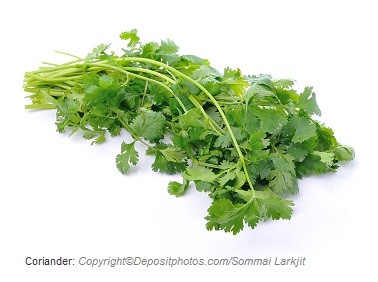Coriander, also known as cilantro or Chinese parsley, is a green leafy vegetable from  Apiaceae family and is related to celery. Every 100 grams of coriander contains 4 grams of carbohydrates, 3 grams of fiber and 2 grams of protein.
Apiaceae family and is related to celery. Every 100 grams of coriander contains 4 grams of carbohydrates, 3 grams of fiber and 2 grams of protein.
Average calories: 24 per 100 grams.
|
Coriander: 100 grams |
|
|
Carbohydrate |
4 |
|
Fiber |
3 |
|
Protein |
2 |
|
Fat |
0 |
|
Calories |
24 |
Vitamins found in higher amounts: vitamins K, A, C, B2, B9 and E. Every 100 grams of coriander provides 310 mcg of vitamin K and 6750 IU of vitamin A.
Minerals found in higher amounts: manganese, potassium, copper, iron and calcium.
Phytonutrients found in higher amounts and their health benefits: coriander and its seeds are rich in carotenoids, volatile oils (carvone, geraniol, borneol, elemol and linalool), flavonoids (epigenin, quercetin, rhamnetin, and kaempferol), and phenolic compounds (caffeic acid and chlorogenic acid).
Carotenoids include beta-carotene, lutein and zeaxanthin. They support healthy eyes. Flavonoids and phenolic compounds are potent antioxidants with anti-inflammatory, anti-cancer and immune-boosting properties.
Volatile oils have antibacterial activity. They are also used in perfumes, cosmetics, and flavoring foods and drinks.
Certain health benefits of coriander are:
- Coriander has an antibacterial activity against Salmonella. The active ingredient against Salmonella is an organic compound called “dodecenal”, which is usually found both in seeds and fresh leaves. It acts like a powerful antibiotic.
- It is traditionally an anti-diabetic vegetable.
- Helps reduce cholesterol and triglyceride levels.
- Is beneficial in people with multiple sclerosis (MS).
Coriander can detoxify heavy metals especially mercury from the body through a process called “chelation”.

